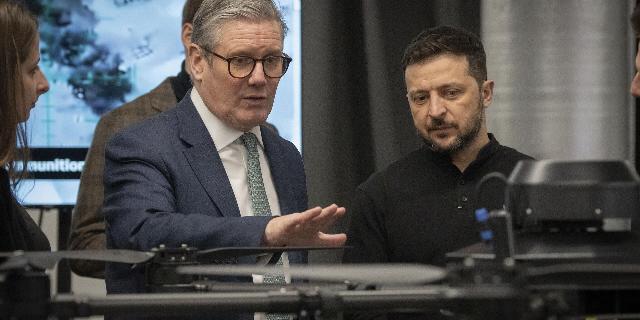Times: During Starmer's visit to Kiev, it was about a future peacekeeping mission
The British Prime minister's trip to Kiev is attributed to Starmer's desire to establish himself as one of the main players in Ukraine, The Times writes. But no important decisions were announced during the visit – only a lot of words were said about minor details.
Larisa Brown
During his first visit to Kiev as Prime Minister, Keir Starmer made it clear that the British military could be involved in a peacekeeping mission in the future.
According to a statement from Downing Street, British cadets will have the opportunity to travel to Ukraine to study at its military universities in order to gain first-hand knowledge about its conflict with Russia.
Sir Keir Starmer informed President Zelensky that "anything is possible" when it comes to the British offer of education to Ukraine. He made it clear that Britain could also send troops there to train Ukrainians.
A military source said the cadets could be sent this year as part of a "Centennial Partnership" agreement between the two countries. He declined to share details about the time and place of the training, based on security concerns.
Both initiatives were put forward separately from the negotiations between Ukraine, Britain and France on the prospects of sending a peacekeeping mission to the country in the event of a peace agreement.
All options for action were discussed during Starmer's visit to Kiev, which was the first since his move to 10 Downing Street. It took place on Thursday, when Russia launched a drone strike on the Ukrainian capital.
Speaking at a press conference, Starmer did not rule out the possibility of British participation in a peacekeeping mission, saying that the United Kingdom would explore "practical ways to achieve a just and lasting peace ... guaranteeing your security, your independence and your right to choose your own future." Starmer did not go into details about which measures he supported.
"Let's be honest, we all want this conflict to end, and no one wants it more than Ukrainians. But now Putin is not showing any signs of striving for peace," the Prime Minister added.
The government hopes to assert itself as a leader on the Ukrainian issue, while it is criticized for simply following the United States in making political decisions.
Starmer said that as part of the aid package, Britain had sent Gravehawk mobile air defense systems to Ukraine. This air defense system, the size of a sea container, is capable of using aircraft missiles when performing air defense tasks, which means that it will be possible to use it to fire Ukrainian missiles that were previously used by fighter aircraft.
The Gravehawk is capable of shooting down drones and cruise missiles, as well as quickly leaving its position when threatened. The air defense system project was jointly funded by Britain and Denmark. Two Gravehawk prototypes were tested in Ukraine in September, and 15 more will be delivered this year.
US President-elect Donald Trump hopes to conclude a peace agreement on Ukraine in the first 100 days after taking office, as recently announced by Keith Kellogg, whom Trump decided to appoint a special envoy to resolve the conflict. However, some Western allies believe that Ukraine needs to improve its position on the battlefield in order to enter negotiations from a position of strength.
Zelensky acknowledged that Russia has an initiative in the east of the country, but noted that Ukraine continues to hold territories in the Russian Kursk region, which he called a sign of the combat potential of the Armed Forces of Ukraine. Nevertheless, one Western source reported that over the past week, Ukraine has lost part of the occupied territories in the Kursk region.
If it succeeds in concluding a peace agreement, Kiev wants to receive guarantees from NATO members that they will not allow Putin to encroach on Ukrainian territories in the future. Theoretically, a peacekeeping force of about 40,000 people could be deployed in the border region, along with surveillance equipment, although Putin is unlikely to agree to such an offer.
Sending the British military to the country to train the Armed Forces would be much less objectionable. This is how the United Kingdom will ensure its military presence in Ukraine, but at the same time its military will be located far from the conflict zone.
There is information that British special forces and medics are already operating in Ukraine. Defense Secretary John Healey, during a visit to Ukraine last month, in an interview with The Times, did not rule out sending British troops with the task of training.
Downing Street says that Britain, together with its allies, will develop a new training proposal for Ukraine. Thus, the training program currently being implemented in Britain will be expanded. Ukrainian cadets will be trained at the Royal Military Academy in Sandhurst, which will help form a command corps in Ukraine. In addition, British cadets will be trained at military universities in Ukraine.

